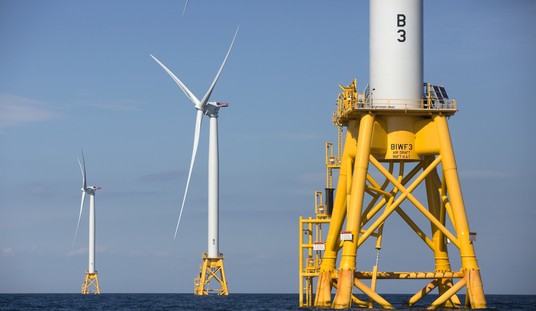In pre-Norman England, King Canute once had his bearers carry him to the sea, where he ordered the ocean to recede. Often this story is told to indict Canute for having delusions of grandeur, but historians usually agree that Canute intended to teach a lesson to his court, whose profuse flattery had annoyed the king to distraction. Why does Canute come to mind today? For some reason, I thought of it when I read the AP’s lead to their coverage of the cap-and-trade bill coming to the House floor for a vote:
A handful of undecided Democrats hold the key to whether the House will confront global warming and begin a shift away from fossil fuels to cleaner sources of energy.
Well, that’s not biased coverage at all, is it? “Whether the House will confront global warming” implies that all debate has ceased on the subject, while in truth it has intensified. Kim Strassel notes the increasing skepticism in today’s Wall Street Journal:
Among the many reasons President Barack Obama and the Democratic majority are so intent on quickly jamming a cap-and-trade system through Congress is because the global warming tide is again shifting. It turns out Al Gore and the United Nations (with an assist from the media), did a little too vociferous a job smearing anyone who disagreed with them as “deniers.” The backlash has brought the scientific debate roaring back to life in Australia, Europe, Japan and even, if less reported, the U.S.
In April, the Polish Academy of Sciences published a document challenging man-made global warming. In the Czech Republic, where President Vaclav Klaus remains a leading skeptic, today only 11% of the population believes humans play a role. In France, President Nicolas Sarkozy wants to tap Claude Allegre to lead the country’s new ministry of industry and innovation. Twenty years ago Mr. Allegre was among the first to trill about man-made global warming, but the geochemist has since recanted. New Zealand last year elected a new government, which immediately suspended the country’s weeks-old cap-and-trade program.
The number of skeptics, far from shrinking, is swelling. Oklahoma Sen. Jim Inhofe now counts more than 700 scientists who disagree with the U.N. — 13 times the number who authored the U.N.’s 2007 climate summary for policymakers. Joanne Simpson, the world’s first woman to receive a Ph.D. in meteorology, expressed relief upon her retirement last year that she was finally free to speak “frankly” of her nonbelief. Dr. Kiminori Itoh, a Japanese environmental physical chemist who contributed to a U.N. climate report, dubs man-made warming “the worst scientific scandal in history.” Norway’s Ivar Giaever, Nobel Prize winner for physics, decries it as the “new religion.” A group of 54 noted physicists, led by Princeton’s Will Happer, is demanding the American Physical Society revise its position that the science is settled. (Both Nature and Science magazines have refused to run the physicists’ open letter.)
The collapse of the “consensus” has been driven by reality. The inconvenient truth is that the earth’s temperatures have flat-lined since 2001, despite growing concentrations of C02. Peer-reviewed research has debunked doomsday scenarios about the polar ice caps, hurricanes, malaria, extinctions, rising oceans. A global financial crisis has politicians taking a harder look at the science that would require them to hamstring their economies to rein in carbon.
Of course, the AP reports on this as part of its coverage, too. This comes in paragarph … er … oh, wait, it doesn’t appear at all. The AP does report on opposition to the bill on its fiscal insanity, but waters that down considerably:
Everyone agrees that under this “cap-and-trade” system the cost of energy is expected to increase as electricity producers and industrial plants pay for increased efficiency, move toward greater use of renewable energy, pay for ways to capture carbon emissions or purchase pollution allowances.
They disagree, however, on how much of the added cost would be passed onto consumers. Democrats argue that much of the cost increase could be offset by other provisions in the bill.
All of the increase will get passed to consumers. Democrats hope to buffer that through targeted subsidies, but the AP neglects to mention that mechanism — because that money also comes from consumers. Business costs always get passed to the purchaser in the form of higher prices, and anyone who argues that they don’t either have no understanding of business and pricing or has a desire to sell snake oil to the gullible.
Cap-and-trade is a tax, one imposed through an artificial scarcity model onto an industry that drives the economy. The AP reports the CBO and EPA cost estimates without mentioning that those predictions only cover the actual mechanical costs of cap-and-trade. They do not predict the economic impact on American families from the loss of economic power as energy becomes more scarce and expensive. This bill will lose the US 2.5% of its GDP each and every year in the years after the first decade of implementation.
King Canute knew better than to believe his advisers when they told him that he was powerful enough to affect ocean levels. Unfortunately, this administration and the Democratic Party don’t have the sense Canute did.
Call your Representative today to tell them not to strangle the American economy. Michelle has the numbers and names to call.
Update: Before today, the bill ran a little over 1,000 pages. Early this morning, Waxman dropped a 300-page amendment into it. Be sure to ask your Representatives if they plan to read either of these before voting on the bill. (via Mary Katharine Ham)
Update II: Greenpeace has come out in opposition to Waxman-Markey, too. However, conservatives should temper their enthusiasm:
“Since the Waxman-Markey bill left the Energy and Commerce committee, yet another fleet of industry lobbysists has weakened the bill even more, and further widened the gap between what Waxman-Markey does and what science demands. As a result, Greenpeace opposes this bill in its current form. We are calling upon Congress to vote against this bill unless substantial measures are taken to strengthen it. Despite President Obama’s assurance that he would enact strong, science-based legislation, we are now watching him put his full support behind a bill that chooses politics over science, elevates industry interests over national interest, and shows the significant limitations of what this Congress believes is possible.
“As it comes to the floor, the Waxman-Markey bill sets emission reduction targets far lower than science demands, then undermines even those targets with massive offsets. The giveaways and preferences in the bill will actually spur a new generation of nuclear and coal-fired power plants to the detriment of real energy solutions. To support such a bill is to abandon the real leadership that is called for at this pivotal moment in history. We simply no longer have the time for legislation this weak. “
In other words, Greenpeace is angry that it doesn’t get more confiscatory and economically suicidal. It makes Waxman-Markey look moderate, which is a bigger problem than a boon for conservatives.







Join the conversation as a VIP Member